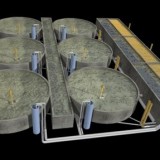Mike Smyth had an interesting column in Sunday’s Province, dealing with the proposed second and much larger Kinder Morgan Pipeline to Vancouver, which would see a five-fold increase in tanker traffic through Vancouver’s harbour. In it he told us that the company was being very laid back compared with Enbridge, holding a series of public information sessions. Mr. Smyth, quite correctly in my view, said that the public, if only mildly involved now, would change its attitude toward Kinder Morgan.
Kinder Morgan will and indeed is being dishonest with the public. This is no different than Enbridge or any other pipeline – they all maintain that there will be no spills and that, if there are, they will be minor (which is what Enbridge said about Kalamazoo) and quickly cleaned up. This is nonsense and the public will very soon be letting Kinder Morgan know that.
We must all know that corporations simply do not tell the truth except by accident. Their face to the public comes from highly skilled public relations departments and highly skilled and expensive outside agencies.
As we have seen with BP in the Gulf of Mexico disaster, after the tragedy they are quick to find pictures of healthy birds and animals to show that all is well again.
Close to home, the Ashlu private river power project is of interest. Ledcor received its right to dam and divert the river on the basis that migratory salmon would not be interfered with. The permission was in these words:
A decision was taken on November 30, 2009 and was that the authority may exercise any power or perform any duty or function with respect to the project because, after taking into consideration the screening report and taking into account the implementation of appropriate mitigation measures, the authority is of the opinion that the project is not likely to cause significant adverse environmental effects. (emphasis added).
To say that salmon have indeed been adversely interfered with is putting it very mildly indeed.
This report from the Wilderness Committee:
More than 3,000 pages of documents obtained separately by the Vancouver Sun and the Wilderness Committee through freedom of information requests show water-flow fluctuations caused by run-of-river hydro projects are killing fish — and the problem is not isolated.
While independent power producers insist their sector remains the cleanest energy option, the documents bolster environmentalists’ long-standing concerns about the industry.
“I’m seeing significant environmental problems,” said Gwen Barlee, policy director for the Wilderness Committee. “And that runs completely counter to what the companies are saying, which is essentially, ‘Trust us with your wild rivers and there won’t be any problems.’ ”
The documents detail repeated short-term fluctuations in water flows, resulting in the stranding and killing of juvenile fish downstream of two plants, Capital Power on the lower Mamma and Innergex on Ashlu Creek, another tributary of the Squamish.
In one incident on Ashlu Creek, on May 8, 2010, 166 salmon and trout fry became stranded due to rapidly dropping water levels. Fewer than half of the fry could be returned to the creek alive. Another 39 fry died during a stranding on April 20, 2011.
Neither hydro operation has been charged.
This happens all over the province – companies get government permission to dam a river, the understanding being that salmon runs will not be harmed, then the salmon runs are extensively damaged.
What is also endemic is the lack of any government surveillance of water used and released by the company. They promise, cross your heart and hope to die, that they will conform to the terms and when they don’t there are no consequences.
While Kinder Morgan isn’t into hydroelectricity, its pipeline will cross many streams and rivers and it too will cross its heart and promise that it will be so careful in fish habitat we have nothing to worry our pretty little heads about.
THEY KNOW THAT THERE WILL BE SPILLS IN FISH HABITAT, THAT THE CONSEQUENCES WILL BE HORRIBLE, AND THAT THERE IS NOTHING THEY CAN DO ABOUT IT.
But there is much more. If this line goes through there will be upwards of 350 tankers leaving Burrard Inlet every year going through the very dangerous 2nd Narrows Bridge, loaded with deadly bitumen.
We will be assured that there won’t be any accidents and, if there are, why it will all be cleaned up spick and span and that there will be no residual damage.
This is bullshit and they know it.
Kinder Morgan’s Director of Engineering and Marine Development Mike Davies acknowledged at a recent debate in Vancouver that there have been more than 70 spills from the current Trans Mountain Pipeline over its 60 year lifetime. That includes a 2007 spill that drenched a Burnaby neighbourhood in oil – for which the company was found partially responsible and ordered to pay a $150,000 fine by the courts. Then, last week we learned from a National Energy Board report on the spill of 90,000 litres of oil from the company’s Abbottsford tank farm in 2011 that emergency alarms warning of a leak went ignored by operators for hours.
This takes me into politics.
Adrian Dix, the leader of the NDP, won’t take a stand on the Kinder Morgan line until it formally files its application.
This cop-out is raw cowardice. Dix knows as much as he ever will about this pipeline – enough to oppose it no matter how much they will ship.
This is causing us at The Common Sense Canadian to re-think our policy for next May’s election.
Dix is evidently worried that he will be seen as “against everything”. No one, least of all Damien Gillis and I want Dix to be against everything but only those projects that will damage our precious province and all the fauna and flora that our wilderness sustains.
In addition to damage done in any particular place there is the question of the cumulative impact of the half dozen or more oil, gas and condensate pipelines now proposed for BC. No environmental process, Provincial or Federal, has addressed this question.
In fact the process reminds one of a Soviet “show” trial. The result is certain but to make it look good, governments hold hearings where the desirability of the project is out of order, it already being a “done deal”.
As it sits right now, as we survey the scene on environmental matters, there is little to separate the uncaring, corrupt Liberals from the gutless NDP.






